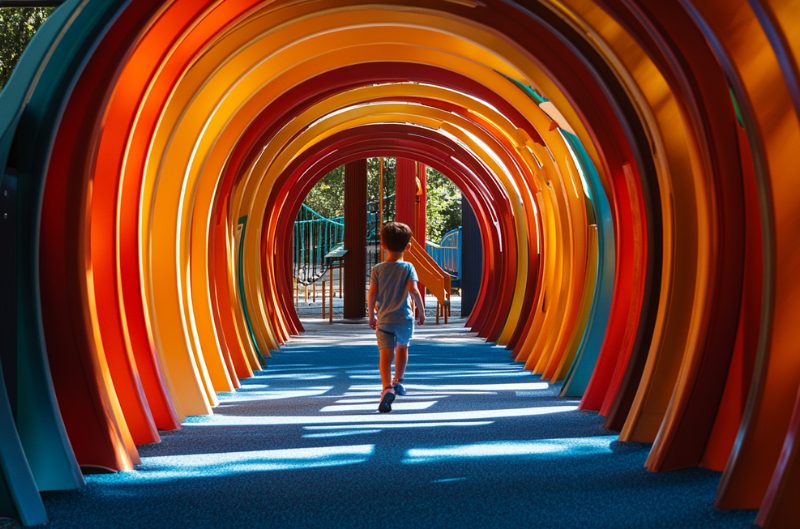
Playgrounds A Gateway to Mental Well-being and Stress Relief for Families
Author: Austin Stanfel
In today’s fast-paced world, where stress and mental health challenges are increasingly prevalent, the humble playground emerges as an unexpected hero in promoting mental well-being and stress relief for families. Beyond recreational spaces, playgrounds offer many benefits that contribute to the psychological health of children and adults.
The Power of Play
Emotional Regulation and Stress Relief
Playgrounds serve as natural stress-busters for children. When kids engage in active play, they experience a wide range of emotions, learning to regulate them healthily. This emotional rollercoaster of excitement, frustration, and triumph helps children develop crucial coping mechanisms. The physical activity involved in playground play releases endorphins, the body’s natural stress-relievers, contributing to overall well-being.
Boosting Self-Confidence
As children master challenging playground structures, they experience a significant boost in self-confidence and self-esteem. This sense of accomplishment translates into other areas of their lives, fostering a positive self-image crucial for mental health.
Social Interaction and Mental Health
Building Social Skills
Playgrounds are not just about physical activity; they are social hubs where children learn to interact with peers. These interactions help kids develop essential social skills such as sharing, taking turns, cooperating, and resolving conflicts peacefully. These skills are fundamental in building healthy relationships and contribute significantly to long-term mental health.
Fostering Community Connections
Playgrounds allow families to connect with other families in the community. This social interaction also benefits parents, providing opportunities for adult conversation and community building, which can alleviate feelings of isolation often experienced by caregivers.
Cognitive Development and Mental Stimulation
Enhancing Problem-Solving Skills
Playground equipment presents children with various physical and mental challenges. Navigating these challenges enhances problem-solving skills and cognitive flexibility. This mental stimulation is crucial for brain development and can contribute to improved focus and attention span.
Sparking Creativity and Imagination
Unstructured play in playgrounds allows children to engage their imagination freely. This creative play is enjoyable and beneficial for cognitive development and emotional regulation. Children can process their experiences and emotions in a safe, imaginative environment.
Nature Connection and Mental Health
Green Spaces and Psychological Benefits
Research has shown a strong correlation between access to green spaces and improved mental health. Children who grow up with access to natural spaces, including playgrounds with green elements, demonstrate better mental health outcomes as adults. Trees and plants in playgrounds can improve oxygen supply and blood circulation, contributing to overall well-being.
Reducing Symptoms of Mental Health Disorders
Studies have indicated that children with attention deficit disorder (ADD or ADHD) experience fewer symptoms and improved concentration after being active outdoors. This suggests that regular playground visits could be a complementary approach to managing certain mental health conditions in children.
Family Bonding and Stress Reduction
Quality Time in a Relaxed Setting
Playgrounds provide an ideal setting for families to spend quality time together away from the stresses of daily life. When parents engage in play with their children, it strengthens family bonds and creates positive memories. This shared experience can be a powerful stress reducer for children and adults.
Breaking the Routine
In the structured lives of modern families, playgrounds offer a much-needed break from routine. This change of scenery and activity can refresh mental states, allowing children and adults to return to regular activities with renewed focus and reduced stress levels.
Long-Term Impact on Mental Health
Establishing Healthy Habits
Regular playground visits can establish lifelong habits of physical activity and outdoor engagement. These habits are associated with better mental health outcomes throughout life, including reduced risks of depression and anxiety.
Building Resilience
The challenges and social interactions experienced on playgrounds help children build resilience. This mental toughness is crucial in managing stress and maintaining good mental health in the face of life’s challenges.
Conclusion
Playgrounds are more than just recreational spaces; they are vital contributors to the mental well-being of families. By providing opportunities for physical activity, social interaction, cognitive stimulation, and connection with nature, playgrounds offer a holistic approach to promoting mental health. As communities recognize the importance of these spaces, investing in well-designed, accessible playgrounds becomes not just a matter of recreation but a public health imperative.
In an era where mental health challenges are on the rise, the simple act of visiting a playground can be a powerful tool in promoting psychological well-being and stress relief for families. By embracing the multifaceted benefits of playgrounds, we can foster healthier, happier communities for generations to come.

